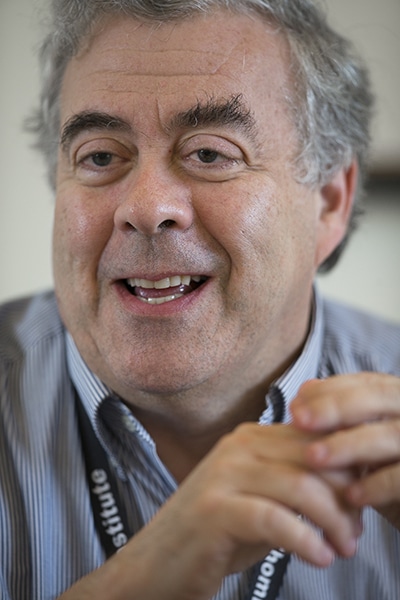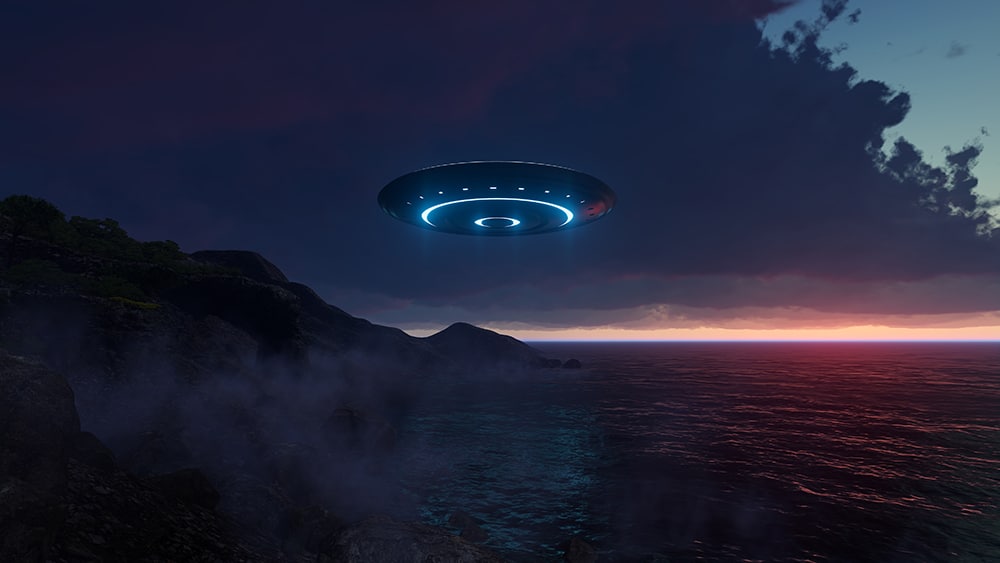A group of Catholic evolutionary biologists, astrochemists, astrophysicists, theologians and astronomers will gather in Washington, D.C., this weekend to discuss a topical scientific issue in high-level government circles.
Extraterrestrials. Advanced alien civilizations. UFOs.

“It’s quite timely, actually,” Stephen M. Barr, president of the Society of Catholic Scientists, said of the organization’s 2021 conference, which is entitled “Extraterrestrials, AI, and Minds Beyond the Human.”
“We don’t know enough to say that it’s improbable or that it is probable that there are highly evolved species out there,” Barr told Our Sunday Visitor.
Conference attendees will be in the nation’s capital from June 4-6 listening to talks on the search for alien life and the likelihood of extraterrestrials at the same time that political leaders and defense officials are discussing unidentified flying objects and their national security implications. What was once snickered at is now a serious topic of discussion.
“We are now relying on military and intelligence-collection capabilities to collect the data and then try to interpret the data. This is not a conversation about how grandma saw some lights in the backyard and then people wind up scratching their heads wondering what it was,” Luis Elizondo, a former military intelligence officer, told the Washington Post in a recent interview.
The U.S. Department of Defense is expected to release a major unclassified report this month — the first of its kind — detailing experiences of unidentified flying objects by U.S. fighter pilots and other military personnel.
In recent weeks, retired service members in media interviews have shared their experiences with airborne phenomena. The government has even released unclassified videos that appear to depict strange-looking objects mimicking the movements of fighter jets.
“Look at that thing!” a pilot screams in one video as his radar locks in on a flying object.
“It’s rotating,” another pilot says.
“My gosh,” the other pilot responds, according to a Washington Post report.
Does this all mean the federal government is about to blow the lid open on “little green men” and flying saucers? Has the evidence finally gotten too much for the Pentagon to cover up what happened at Roswell, or to keep hidden what goes down in Area 51?
The reality may be more down-to-earth than many UFO-chasers would like, Barr said.
“I have no idea what these UFOs are, but I can say that it’s highly unlikely, and I think most scientists would agree it’s extremely unlikely that they are aircraft built by an extraterrestrial intelligent species,” said Barr, a professor emeritus of physics and astronomy at the University of Delaware who directed its Bartol Research Institute.
Given the universe’s estimated age (13.8 billion years) and the vast distances between planetary systems in the same galaxy — much less different galaxies — Barr believes it is unlikely that an advanced alien civilization would exist at a time and place where extraterrestrial explorers would encounter humans on earth.
“The earth is 4.5 billion years old. Human beings have been around for a tiny sliver of that time, probably 200,000 or 300,000 years. Human civilization has only been around 5,000 or 10,000 years. Advanced civilization, far less than that. As far as cosmic time scales go, that’s a blink of an eye,” Barr said.
“The universe is a big place. The galaxy is a big place. Any extraterrestrials in our galaxy who are intelligent are likely to be so far away from us that traveling from there to here would take prohibitively long. The chance they would be alive at this moment in cosmic history is very small. If they were in another galaxy, forget it.”
While Barr believes the odds are against any encounters of the third kind, the jury remains out on UFOs and extraterrestrial life as far as the scientific data is concerned. However, from a Christian standpoint, the possibility that life exists outside of earth’s physical reality is not exactly a new concept.
“I think the first reaction of most Catholics would be something like, ‘Duh!'” said Charles Camosy, a Fordham University moral theologian who opined that alien life looks “more and more likely” in a recent essay for the Washington Post.
“As I wrote in my piece, we are totally at home with non-human intelligences existing along with us,” Camosy told Our Sunday Visitor in an email. “In a way, I think so strongly believing in beings like angels and demons helps create the conceptual space for being quite comfortable with aliens, at least intellectually.”
Spiritual beings such as angels and demons are at least attested to in Scripture. Extraterrestrials have heretofore only inhabited the realm of science-fiction novels, campy television shows, space opera movies and video games.
But if they were ever proven to exist, Camosy and other theologians do not believe that intelligent, rational alien beings like E.T. or Kal-El — aka Superman — would challenge the foundations of Biblical religion.
“It would be about applying the tenets and sharpening them to address this reality that, I think, many have suspected for a long time is probably the case,” said Camosy, who added that the creation story in Genesis is “interpretable in many ways.”
“I think that the main issues of discussion would be about sin, original sin, the fallenness of creation and the redemption of Christ,” Camosy said. “And, again, applying those to new data.”
Christopher Baglow, the director of the Science & Religion Initiative at the University of Notre Dame’s McGrath Institute for Church Life, will deliver a keynote lecture at the Society of Catholic Scientists conference on extraterrestrial life and Catholic theology.
“The Church has never excluded the possibility of life and other creatures outside of this planet,” said Baglow, who told Our Sunday Visitor that just thinking about the possibility of life elsewhere in the universe opens up deeper levels of theological reflection.
Said Baglow: “What might it mean if there are other rational creatures in need of salvation? With the Incarnation, the idea that the Word became flesh and dwelt among us, would that be something worth thinking about with God’s relationship with other rational creatures who he created to know, love and serve him?”
A helpful parallel, Baglow said, would be the Church’s realization during the Age of Discovery that there were ancient civilizations in the New World that had existed for millennia before hearing the Gospel for the first time.
Said Baglow, “That made the Church look back at questions like, ‘What does salvation outside the Church mean? Is there no salvation outside the Church as previously assumed? Or might we refine it in a way to understand it better?'”
The possibility that life exists on other planets might be disconcerting to some Catholics tempted to believe that human existence would be then proven to be a purely natural scientific phenomenon.
“But that doesn’t follow,” Barr said. “It just means however God acted in our creation, he could have acted in the creation of these other beings. Whatever God did on earth, he could do elsewhere.”
Barr added that extraterrestrials endowed with reason and free will would share a human quality in being created in God’s image and likeness.
“If God desires our existence, it follows, why wouldn’t he want similar things elsewhere?” Barr said. “If a person loves flowers, he may not plant one flower, he may plant many flowers. If he loves trees, he may not plant one tree, he may plant many trees.”
For now, at least, alien spacecraft and extraterrestrials demanding to be taken to national leaders remain the stuff of Hollywood. Anyone who thinks the UFOs in the news are actual alien technology still have formidable scientific objections to overcome.
“They could be new (human) technology. They could be glitches in somebody’s apparatus, but it’s a big leap to say they’re alien technology,” Barr said. “What they actually are, who knows?”
Brian Fraga is a contributing editor for Our Sunday Visitor.





